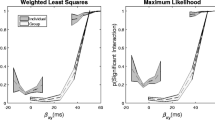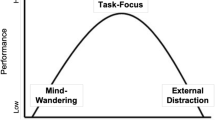Summary
An experimental study of the effects of noise, nightwork and meals showed that these factors influenced different aspects of performance. Speed of performing a low memory load version of a visual search task was influenced by working at night but was unaffected by either noise or meals. A high memory load version of the search task was performed more slowly after consumption of a meal, both during the day and at night, but was not influenced by nightwork. Subjects working in noise produced more errors on the high memory load task than those working in quiet, but neither nightwork nor meals had significant effects on the number of errors. The only evidence of an interaction between factors was obtained in the high memory load search task, where noise reduced the size of the post-meal decline in speed. These results show that the effects of noise, nightwork and meals are largely independent, the exception being the beneficial effect of noise on post-lunch performance. They also demonstrate that the effects of all of these factors depend on the nature of the task being performed, and on whether speed or accuracy is the variable under consideration.
Similar content being viewed by others
References
Bjerner B, Swensson A (1953) Schichtarbeit and rhythmus. Acta Med Scand 278:102–107
Blake MJF (1971) Temperament and time of day. In: Colquhoun WP (ed) Biological rhythms and human performance. Academic Press, London, pp 109–148
Broadbent DE (1971) Decision and stress. Academic Press, London
Broadbent DE (1979) Human performance and noise. In: Harris CM (ed) Handbook of noise control. McGraw Hill, New York, pp 2066–2085
Colquhoun WP, Blake MJF, Edwards RS (1968b) Experimental studies of shift work. I. A comparison of “rotating” and “stabilized” 4-h systems. Ergonomics 11:437–453
Colquhoun WP, Blake MJF, Edwards RS (1968b) Experimental studies of shift work. II. Stabilized 8-h shift system. Ergonomics 11:527–546
Colquhoun WP, Blake MJF, Edwards RS (1969) Experimental studies of shift work. III. Stabilized 12-h shift system. Ergonomics 12:865–882
Craig A (1986) Acute effects of meals on perceptual and cognitive efficiency. In: Nutrition reviews, vol 44, Suppl. Diet and behavior: A multidisciplinary evaluation, pp 163–171
Craig A, Baer K, Diekmann A (1981) The effects of lunch on sensory-perceptual functioning in man. Int Arch Occup Environ Health 49:105–114
Folkard S, Monk TH (1980) Circadian rhythms in human memory. Br J Psychol 71:295–307
Folkard S, Wever RA, Wildgruber CM (1983) Multioscillatory control of circadian rhythms in human performance. Nature 305:223–226
Hildebrandt G, Rohmert W, Rutenfranz J (1974) Twelve and 24 hour rhythms in error frequency of locomotive drivers and the influence of tiredness. Int J Chronobiol 2:97–110
Jones DM, Smith AP, Broadbent DE (1979) Effects of moderate intensity noise on the Bakan vigilance task. J Appl Psychol 64:627–634
Monk TH, Embrey DE (1981) A field study of circadian rhythms in actual and interpolated task performance. In: Reinberg A, Vieux N, Andlauer P (eds) Advances in the biosciences. 30. Night and shiftwork: biological and social aspects. Pergamon Press, London, pp 473–480
Monk TH, Folkard S (1985) Shiftwork and performance. In: Folkard S, Monk TH (eds) Hours of work — temporal factors in work scheduling. Wiley, Chichester, pp 239–252
Smith AP (1983) The effects of noise on strategies of human performance. In: Rossi G (ed) Proceedings of the Fourth International Congress on Noise as a Public Health Problem. Centro richerche e studi amplifon, Milan, pp 797–808
Smith AP, Miles C (1985) The combined effects of noise and nightwork on human function. In: Oborne D (ed) Contemporary ergonomics 1985. Taylor and Francis, London, pp 33–41
Smith AP, Miles C (1986) Acute effects of meals, noise and nightwork. Br J Psychol (in press)
Smith AP, Ottmann W (1986) Einfluß von Umgebungsfaktoren auf die psychische Leistung. In: Rutenfranz J, Kleinbeck U (eds) Enzyklopadie der Psychologie, D/111/1 — Arbeitspsychologie. Hogrefe, Gottingen (in press)
Author information
Authors and Affiliations
Rights and permissions
About this article
Cite this article
Smith, A.P., Miles, C. The combined effects of occupational health hazards: an experimental investigation of the effects of noise, nightwork and meals. Int. Arch Occup Environ Heath 59, 83–89 (1987). https://doi.org/10.1007/BF00377682
Received:
Accepted:
Issue Date:
DOI: https://doi.org/10.1007/BF00377682




